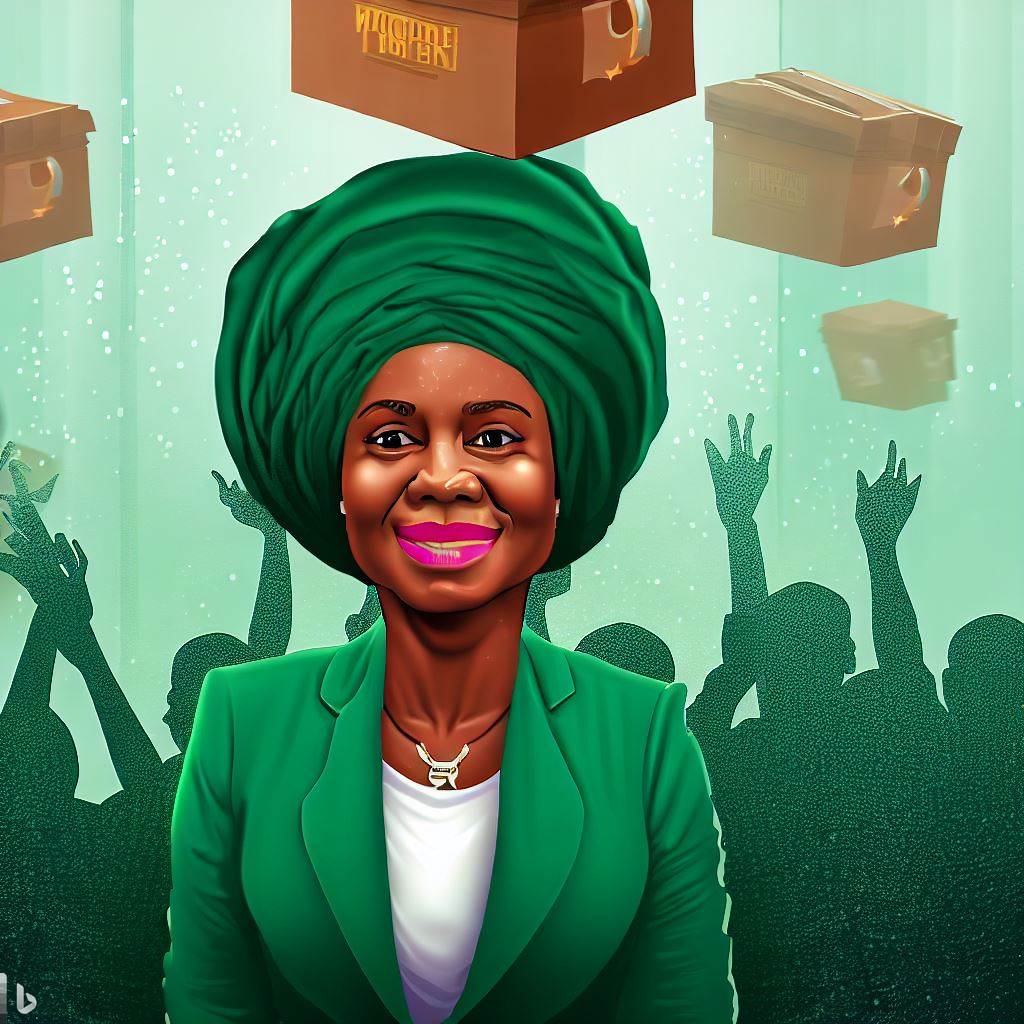Elections in Nigeria: The Role of Politicians Explained
Last Updated on September 14, 2023
Introduction
Elections in Nigeria hold great importance in understanding the role of politicians.
This blog post aims to explain the various roles played by politicians in Nigerian elections.
Definition and Characteristics of Politicians
What a politician is and provide a general overview of their role
- A politician is an individual who actively participates in the political process.
- Their role involves representing the interests of the people and making decisions on their behalf.
Key characteristics and qualities that make a successful politician in Nigeria
- To be a successful politician in Nigeria, certain characteristics and qualities are essential.
- Firstly, politicians must possess strong leadership skills to effectively lead and influence others.
- They should also have excellent communication skills, as effective communication is crucial in politics.
- Politicians should be knowledgeable about the political landscape and the issues affecting their constituents.
- Furthermore, integrity and honesty are important traits for politicians to build trust with the public.
- In addition, politicians must be resilient and able to handle the pressures and challenges of their role.
- Being able to connect with diverse groups of people and build relationships is also vital.
- A successful politician should have a clear vision and the ability to develop and implement effective policies.
- They should be able to adapt to changing circumstances and make informed decisions.
The importance of politicians in shaping the political landscape of the country
- Politicians play a crucial role in shaping the political landscape of Nigeria.
- They have the power to propose and pass laws that affect the lives of the citizens.
- Politicians represent the interests of their constituents and work towards improving their welfare.
- Through their policies and decisions, politicians have the ability to drive economic growth and development.
- Politicians also have the responsibility to ensure transparency and accountability within the government.
- They are the voice of the people and serve as a link between the government and the citizens.
- Politicians have the opportunity to address social issues and promote social justice.
- They can advocate for equal rights, access to quality education, healthcare, and other essential services.
- Moreover, politicians play a crucial role in the democratic process of Nigeria.
- They campaign for votes, participate in debates, and engage in political discourse.
- Through elections, politicians are chosen by the people to represent them.
- They contribute to the peaceful transition of power and the stability of the country.
Read: Ethics and Integrity: Core Values of Nigerian Politicians
Mobilizing Voters
In Nigeria, politicians play a crucial role in mobilizing voters during elections.
How politicians in Nigeria play a crucial role in mobilizing voters during elections
- Politicians employ various strategies to appeal to different voter groups.
- They focus on understanding the needs and aspirations of specific demographic segments.
- Politicians utilize targeted messaging to resonate with different voter groups.
Strategies employed by politicians to appeal to different voter groups
- They emphasize key issues that matter to each group, such as healthcare, education, and job creation.
- Politicians often organize rallies and public events to connect with voters directly.
- They deliver speeches and engage in interactions to inspire and gain support.
- Candidates also use social media platforms to reach out to tech-savvy voters.
- Politicians tap into the power of social networks, leveraging influencers and online communities.
The significance of grassroots campaigns and the role of politicians in engaging with local communities
- Grassroots campaigns hold significant value in Nigerian elections.
- Politicians actively engage with local communities to build trust and understanding.
- They connect with community leaders, religious figures, and influencers to gain support.
- Politicians attend town hall meetings and listen to the concerns of ordinary citizens.
- They present themselves as advocates for the people, promising to address local issues.
- Local rallies and door-to-door campaigns help politicians establish personal connections.
- Politicians walk the streets, sharing their vision and gaining the trust of voters.
- Participating in community service projects helps politicians win over local communities.
- Politicians often provide small-scale development initiatives to demonstrate their commitment.
- Building bridges between ethnic, religious, and cultural groups is crucial for politicians.
- They work towards creating an inclusive narrative that appeals to diverse voter groups.
- Interacting with traditional rulers and community elders helps politicians gain credibility.
In review, politicians in Nigeria play an indispensable role in mobilizing voters during elections. They employ various strategies to appeal to different voter groups, emphasizing targeted messaging and key issues.
Grassroots campaigns and community engagement are of utmost importance, allowing politicians to connect with local communities and establish personal connections.
By building trust, understanding, and inclusivity, politicians aim to secure the support they need to achieve electoral success.
Read: Women in Nigerian Politics: Breaking Barriers
Forming Political Parties and Contesting Elections
In Nigeria, politicians shoulder the responsibility of forming and leading political parties, playing a crucial role in shaping the country’s political landscape.
How politicians in Nigeria are responsible for forming and leading political parties
- Politicians take the lead in formulating the ideologies and principles that define their parties.
- They gather like-minded individuals, rallying them behind a common vision and mission.
- Through their leadership, politicians establish the organizational structure and framework of their parties.
- They recruit and select candidates who align with their party’s goals and aspirations.
The process of contesting elections and the role politicians play in building campaign strategies
- Politicians play a pivotal role in building campaign strategies for electoral contests.
- They devise plans to mobilize supporters, raise funds, and promote their party’s agenda.
- By leveraging their communication skills, politicians engage in extensive grassroots outreach.
- They organize rallies, public meetings, and media appearances to create awareness and gain public support.
- Election campaigns witness politicians actively connecting with voters, addressing their concerns, and seeking their votes.
- Politicians employ various campaign tools such as advertisements, social media, and public campaigns.
The significance of politicians in representing and promoting the interests of their political parties
- The significance of politicians in representing and promoting the interests of their political parties is undeniable.
- They serve as the face and voice of their party, articulating its objectives to the public.
- Politicians are responsible for negotiating alliances and partnerships with other parties.
- They engage in coalition-building efforts to strengthen their party’s electoral prospects.
- Through effective representation, politicians strive to ensure their party’s views and policies are heard and considered.
- They advocate for their party’s interests in legislative bodies, making a case for their implementation.
- Politicians also act as spokespersons for their party, defending its actions and decisions to the media and general public.
- Additionally, politicians are crucial in fostering intra-party democracy and managing internal conflicts.
- They facilitate consensus-building processes, mediating disputes, and maintaining party cohesion.
- By doing so, politicians help create a united front, ensuring the party remains intact and effective.
In general, Nigerian politicians play a vital role in forming and leading political parties. They shape ideologies, recruit candidates, build campaign strategies, and represent party interests.
Their efforts are fundamental in shaping Nigeria’s democratic landscape and the outcome of elections.
Read: Nigerian Political Parties: A Comprehensive Overview

Advocacy and Policy Making
In addition to their role in elections, politicians in Nigeria play a crucial part in advocating for specific policies and legislative changes.
The role of politicians in advocating for specific policies and legislative changes
- Politicians act as advocates for various causes and issues, shaping public opinion and promoting specific policies.
- They use their positions of influence and power to lobby for the implementation of new laws and regulations.
- This advocacy can take the form of public speeches, media campaigns, and collaborative efforts with civil society organizations.
How politicians influence policy-making processes in Nigeria
- Through these actions, politicians drive the policy-making process by bringing attention to pressing issues and urging action.
- Politicians in Nigeria often engage in legislative debates and discussions to bring about policy changes.
- They propose bills and support existing ones that align with their political ideologies and the needs of their constituents.
- Their involvement in the policy-making process helps shape the direction of laws and regulations in the country.
- By voicing the concerns and needs of the electorate, politicians ensure that policies reflect the desires of the people they represent.
- They serve as a bridge between the government and the citizens, ensuring that the voices of the people are heard.
- Politicians are responsible for gathering feedback from the electorate and translating it into tangible policy proposals.
- They hold town hall meetings, conduct surveys, and consult with community leaders to understand local concerns.
- This information helps inform policy decisions and ensures that the needs of the people are adequately addressed.
The importance of politicians in addressing the concerns and needs of the electorate
- The role of politicians in addressing the concerns and needs of the electorate is vital for maintaining social cohesion.
- By advocating for specific policies, politicians can address social, economic, and environmental challenges.
- They work towards implementing policies that promote sustainable development, equitable distribution of resources, and social justice.
- Politicians also play a critical role in representing marginalized groups and minority interests.
- They use their platform to advocate for policies that promote inclusivity, equality, and the protection of human rights.
- Through policy-making, politicians have the power to bring about significant societal change.
- They contribute to the development and implementation of policies that shape the country’s future.
- However, the influence of politicians in policy-making processes does come with concerns.
- Some politicians prioritize their personal gain and interests over the collective needs of the electorate.
Despite these challenges, the active involvement of politicians in policy-making processes remains crucial for societal progress.
Read: Challenges and Triumphs: A Nigerian Politician’s Journey
Political Finance and Corruption
The role of politicians in managing campaign finances and fundraising
Politicians play a crucial role in managing campaign finances, which involves strategizing and budgeting.
They are responsible for raising funds through various channels such as donations, rallies, and events.
Politicians need to ensure that their campaign funds are utilized effectively to maximize their chances of winning.
They must maintain transparency and accountability in their financial dealings to gain the trust of the electorate.
Additionally, politicians often utilize their personal networks and connections to secure financial support for their campaigns.
The issue of corruption and the impact it has on elections in Nigeria
Corruption is a significant issue that deeply affects elections in Nigeria. It undermines the democratic process and erodes public confidence in politicians and the electoral system.
Corrupt practices, such as bribery, embezzlement, and vote-buying, distort the will of the people and manipulate election outcomes.
Corruption creates an uneven playing field, favoring wealthy and influential politicians over those with genuine public support.
The impact of corruption on elections is detrimental to the overall democratic progress and can lead to social and economic instability.
Measures taken to address the problem and the role of politicians in promoting transparency and accountability
To combat corruption in Nigerian elections, several measures have been implemented.
The Independent National Electoral Commission (INEC) has introduced stricter campaign finance regulations and disclosure requirements.
Politicians are required to submit financial reports, detailing their sources of funding and expenditures during campaigns.
Civil society organizations, media, and election monitoring bodies also play a crucial role in exposing corrupt practices.
Politicians need to actively support and participate in these initiatives to promote transparency and accountability.
They should prioritize electoral reforms and advocate for the strict enforcement of anti-corruption laws.
By leading by example and ensuring their own campaigns are free from corruption, politicians can contribute to a fair and credible electoral process.
In summary, politicians have a significant role to play in managing campaign finances and fundraising.
Their actions can either promote transparency and accountability or perpetuate corruption in Nigerian elections.
By taking proactive measures and supporting anti-corruption initiatives, politicians can contribute to a fair and democratic electoral process.
Conclusion
Understanding the role of politicians in Nigerian elections is crucial.
We have discussed key points such as the power of politicians to influence the outcome of elections, the strategies they employ, and the impact they have on the democratic process.
By understanding these dynamics, citizens can make informed decisions during elections and hold politicians accountable for their actions.
It is important for readers to stay informed about political issues, engage in discussions, and actively participate in the political process.
By doing so, we can ensure that our voices are heard, and our country progresses towards a more transparent and accountable democracy.
Let us strive to be active citizens, staying vigilant, and demanding the best from our politicians. Together, we can shape the future of Nigeria.


